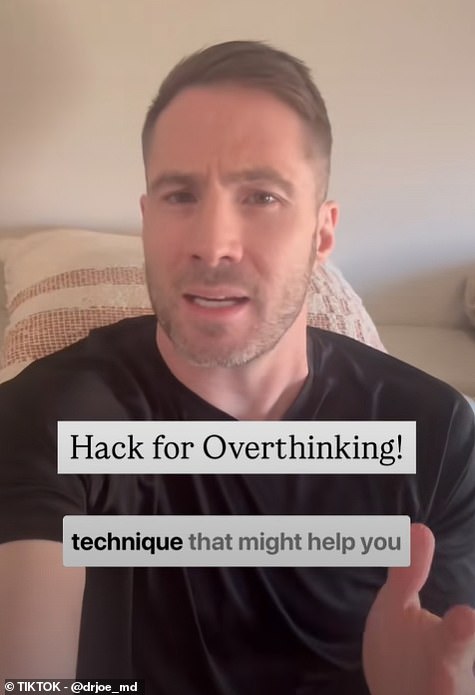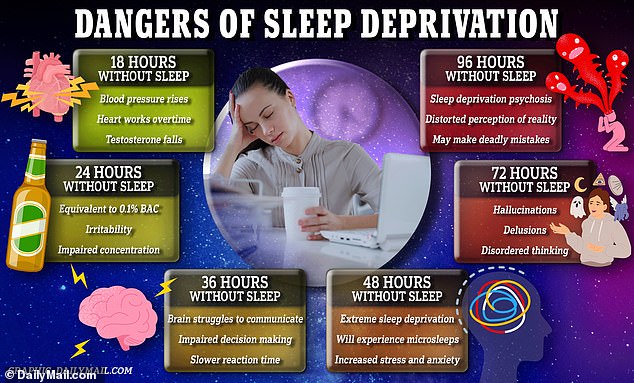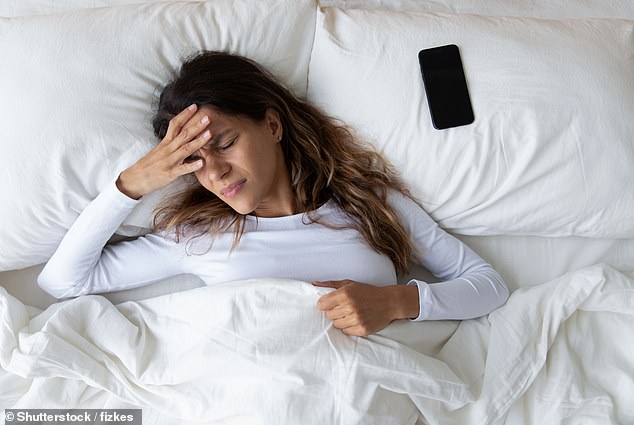If you’re a victim of disturbed sleep, you could be in luck. For one doctor believes he may have solved the mystery.
A simple one-minute ‘effective trick’ could help calm the nerves in seconds — by ‘fooling’ the body into thinking it is relaxed.
According to Dr Joe Whittington, a US-based emergency room medic, taking control of your eye movement by focusing on a single object can help restore calm.
In a TikTok video watched more than 20,000 times, he urged people to trying the method, known as the ‘Infinity Tracing Technique’.
This involves putting a finger up into the air and tracing the infinity symbol slowly.
Dr Joe said: ‘Brain won’t shut up at night? Do you ever lay in bed at night overthinking all of the embarrassing things you’ve done since childhood? Same.
‘As you’re tracing this infinity symbol, you’re going to just follow it with you eyes — only your eyes.
‘What this does is activate your vestibular center which is involved with your balance and eye movements.’

According to Dr Joe Whittington, a US-based emergency room medic, taking control of your eye movement by focusing on a single object can help restore calm
According to the NHS the vestibular system — located within the inner ear — is stimulated by movement up or down, backward or forwards, and around or over.
Focusing on gentle, slow and predictable movements are just one of the techniques, the health service suggests to calm a sensitive vestibular system.
While the method isn’t a replacement for professional support, many praised Dr Whittington’s advice to ease the nightly onslaught of overthinking.
‘Didn’t realize why I did this.. but it makes sense now,’ one TikTok user said.
Others also compared it to Eye Movement Desensitization and Reprocessing (EMDR) therapy, a psychological treatment that’s been found to reduce the symptoms of PTSD.
‘That’s almost the same thing as EMDR. Science behind it is fascinating!’, another wrote.
‘DIY EMDR therapy,’ a second said, with a third adding: ‘Sounds like the same science behind EMDR therapy’.
EMDR is recommended by NHS watchdog the National Institute for Health and Care Excellence (NICE) to help treat PTSD alongside other talking therapies.

Sleep deprivation can lead to obesity, memory loss, diabetes, heart disease, heightened and unstable emotions, impaired ability to learn and a reduced immune response, leaving you vulnerable to disease

While the method isn’t a replacement for professional support, many praised Dr Whittington’s advice to ease the nightly onslaught of overthinking
It uses one of two ways to process memories — moving your eyes from side to side or tapping from side to side.
This is believed to stimulate either side of your brain in an alternating left-right fashion to help you access your subconscious mind and process what is stored in there and how it affects you.
People often take around 10 to 20 minutes normally to nod off after turning off the lights, the Sleep Foundation say.
Last year, a study found that around one in six Brits suffer insomnia, yet 65 per cent never seek help for their sleep problem.
The poll of 2,000 people, by The Sleep Charity, found nine in ten experience some sort of sleep problem, while one in two engage in high-risk or dangerous behaviours when unable to sleep.
Poor sleep has been linked to a number of health problems, including cancer, stroke and infertility.
Experts have long advised that waking up during the night does not necessarily mean you have insomnia, which figures suggest affects up to 14million Brits.
Still, sleep deprivation takes its own toll, from irritability and reduced focus in the short term, to an increased risk of obesity, heart disease and diabetes.
According to the American Sleep Association, nearly 70 million Americans also have a sleep disorder.














